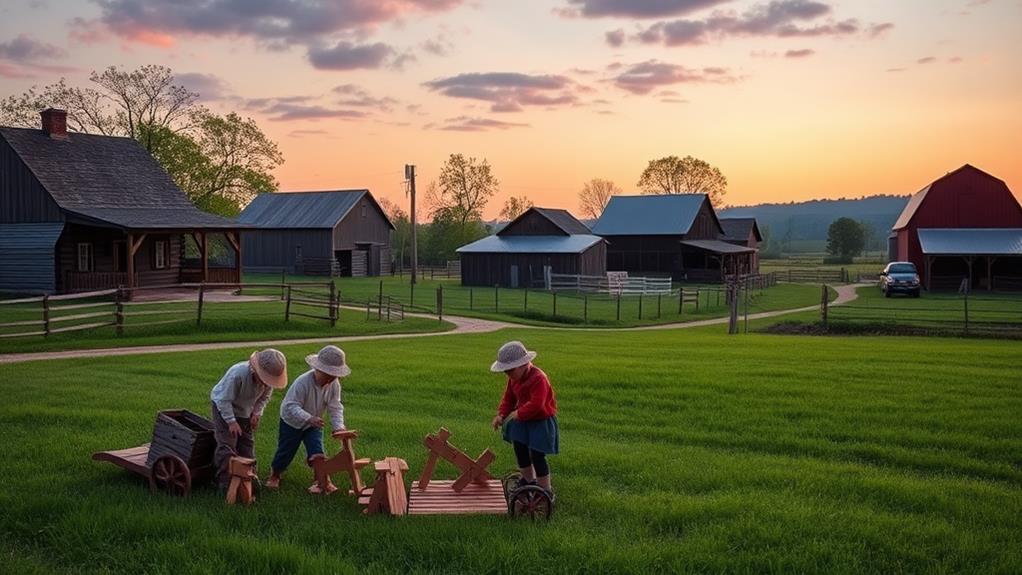When you think about naming a child, have you considered the depth behind Amish names? These names aren't just labels; they carry significant meanings rooted in tradition and community. From biblical influences like Jacob and Miriam to unique choices that reflect Amish values, each name tells a story. You might be surprised by how these selections can resonate with modern sensibilities while honoring a rich heritage. As you explore this topic further, you'll uncover the fascinating reasons behind these timeless names and what they signify in today's world.
Meaning of Amish Names
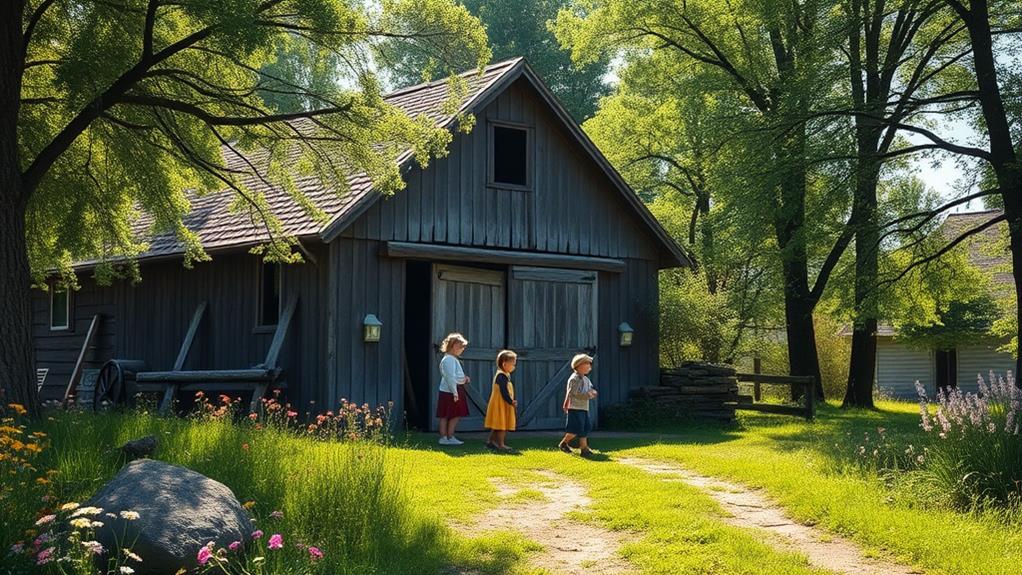
Amish names carry deep meanings that reflect the values and beliefs of the community. Each name is often chosen with care, emphasizing qualities that are important in Amish life, such as humility, faith, and family. For example, names might be derived from biblical figures or saints, connecting the individual to a larger spiritual heritage. When you hear names like Levi or Sarah, you're not just hearing a name; you're hearing a story that echoes through generations.
In the Amish culture, names can also indicate familial ties. Many children are named after grandparents or other relatives, honoring their lineage and maintaining a strong sense of community. This practice reinforces the idea that everyone plays a role in a larger family network, promoting unity and support among members.
Additionally, the meanings behind names can serve as reminders of the values the Amish strive to uphold. For instance, names like Grace or Hope can inspire individuals to embody those virtues throughout their lives.
Traditional Boys' Names
In the Amish community, traditional boys' names often reflect the values and heritage discussed earlier. Many of these names carry deep meanings, drawing from biblical origins or significant family connections. You might come across names like Jacob, which means "supplanter," or Samuel, meaning "God has heard."
These names not only pay homage to the past but also embody virtues like faith and strength. Another common name is Daniel, symbolizing wisdom and justice, while David, meaning "beloved," is also very popular. You might notice that names like Eli and Noah are cherished for their simplicity and strong historical ties.
It's interesting to see how these names are often passed down through generations, creating a sense of continuity within families. When you hear these names, you can sense a connection to the community's values of humility and hard work.
Ultimately, choosing a traditional boys' name in the Amish culture isn't just about the sound or trend; it's about preserving identity and honoring ancestors. So, if you're considering a name, think about how it reflects not only your family's history but also the broader community's values.
Unique Girls' Names
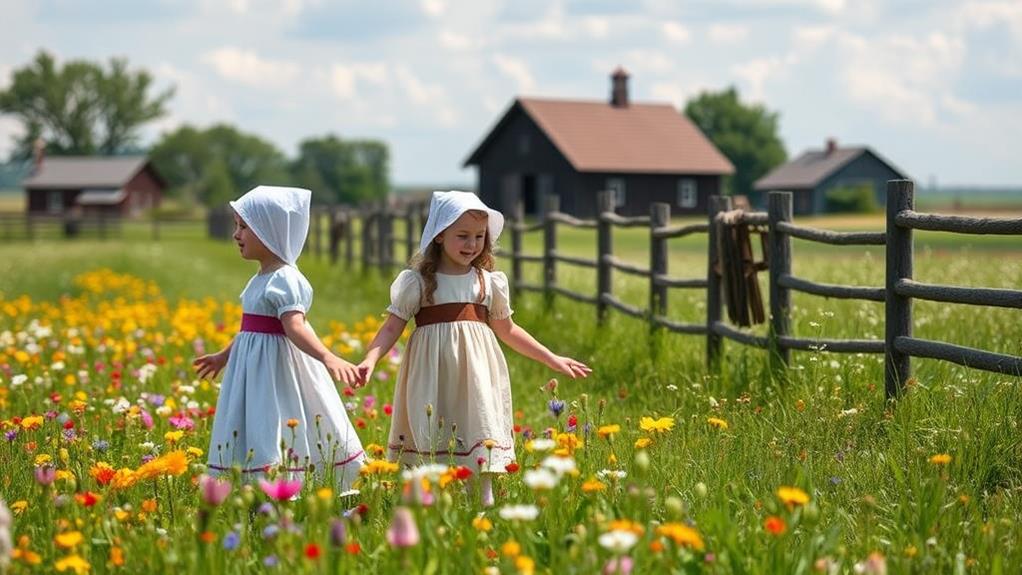
Choosing unique girls' names can be a delightful journey, rich with meaning and cultural significance. Many Amish names for girls stand out for their charm and individuality. For example, the name "Leah" not only has a lovely sound but also carries a sense of grace and beauty.
You might also consider "Miriam," which is both elegant and timeless, making it a favorite among many families. Another unique option is "Ruth," a name that evokes feelings of loyalty and friendship.
If you're looking for something less common, "Zillah" is a distinctive choice that's sure to turn heads while also honoring tradition. Names like "Elda" and "Adina" are perfect for parents who want something that feels fresh yet carries a historical weight.
Each of these names reflects the values and heritage of the Amish culture, giving your child a connection to their roots. Don't be afraid to explore variations and combinations, too! Unique names can be a beautiful way to express your family's identity.
Embrace the journey of finding the perfect name that resonates with you and your loved ones.
Biblical Influences
Rooted in faith and tradition, many Amish names draw inspiration from the Bible, reflecting both spiritual significance and cultural heritage. When you explore these names, you'll find that they often hold deep meanings, connecting families to their beliefs and values.
For boys, names like Eli, meaning "ascended" or "my God," and Isaac, which means "laughter," embody positive attributes that families cherish. These names not only honor biblical figures but also serve as reminders of God's promises.
For girls, biblical names such as Miriam and Naomi are popular choices. Miriam, meaning "beloved," represents strength and leadership, while Naomi, meaning "pleasantness," highlights joy and kindness. By choosing these names, Amish families express their hopes for their children's futures and reaffirm their commitment to their faith.
You might also notice that some names are adapted from their original forms, allowing unique twists that still resonate with their biblical roots. This blend of tradition and individuality makes Amish names particularly meaningful.
Whether you're seeking inspiration for your own family or simply curious about Amish culture, biblical names offer a rich tapestry of significance that connects generations.
Historical Significance
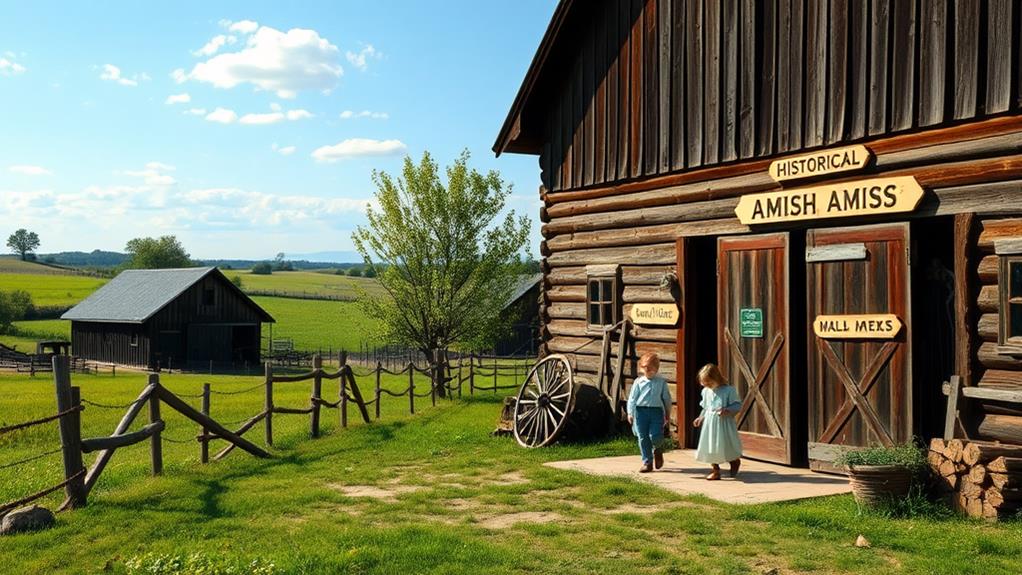
Amish names carry a historical significance that reflects the community's values and way of life. When you dive into the names chosen for boys and girls in the Amish culture, you'll notice they often stem from deep-rooted traditions and beliefs. Many names are derived from biblical figures, honoring the faith that guides the community. This connection to their spiritual heritage is essential, emphasizing the importance of religion in everyday life.
Additionally, names often carry family significance, linking generations together and preserving family history. You might find names passed down through the years, creating a sense of continuity and belonging. Each name tells a story, connecting the individual to their ancestors and the Amish way of life.
Amish parents tend to favor names that are simple yet meaningful, often avoiding more modern or trendy names that don't align with their values. This practice ensures that the names remain timeless, reflecting the community's commitment to humility and simplicity.
Modern Adaptations
In recent years, many Amish families have begun to embrace modern adaptations in naming practices while still respecting their heritage. You might notice that some names have evolved, blending traditional Amish roots with contemporary trends. For instance, names like Leona or Amos might be paired with more modern middle names, creating unique combinations that reflect both tradition and individuality.
Additionally, some families are opting for names inspired by popular culture. While they might choose to keep the first name traditional, they often mix in names from books, movies, or even nature, making them feel more relatable to the outside world. This balance allows you to honor your ancestors while still fitting into today's society.
Furthermore, you'll find that some Amish parents are choosing shorter or simpler names, believing they're easier for both their children and others to pronounce. This approach reflects a growing trend toward practicality, showing how naming practices can adapt over time without losing their essence.
Popularity Trends
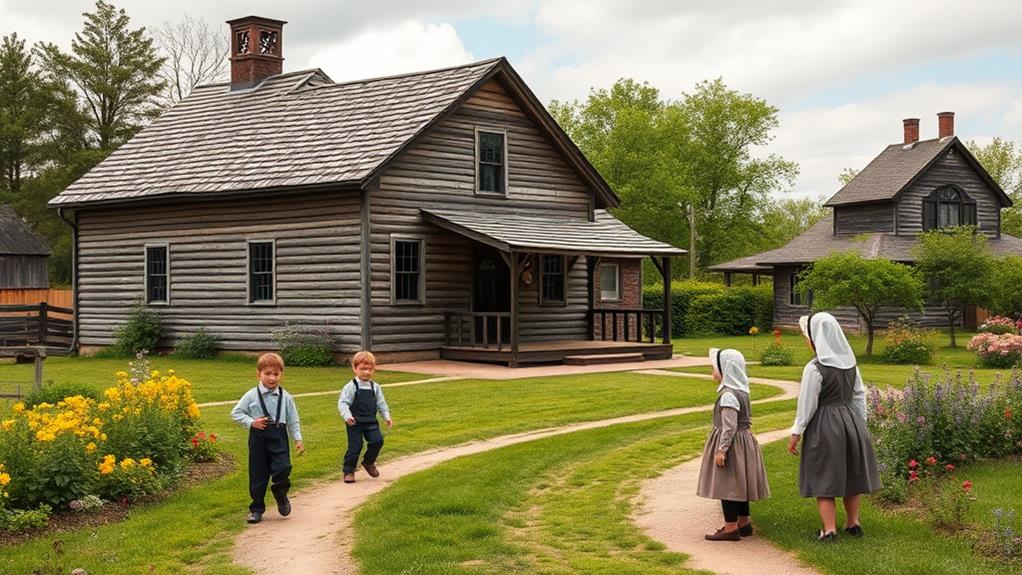
As naming trends evolve, it's fascinating to see how certain names gain and lose popularity within the Amish community. Over the years, traditional names like Levi and Esther have remained favorites, reflecting the community's values and heritage.
However, you might notice newer names, such as Ella or Caleb, starting to make their way into families. This shift often occurs as younger generations seek a blend of modernity and tradition.
You might wonder why some names fade while others flourish. Cultural influences, media, and even community events can play a significant role. For instance, a popular movie or book featuring an Amish character might spark interest in a particular name.
Additionally, as families grow and change, so do their preferences.
It's interesting to note that while some names cycle in and out of favor, many Amish parents still hold onto the classics, ensuring their children carry a piece of their heritage.
This balance between the old and the new creates a unique landscape of names that reflects both personal identity and community values.
Cultural Heritage
The rich tapestry of cultural heritage within the Amish community shapes not just their way of life but also the names they choose for their children. When you explore this unique culture, you'll find that names often reflect deep-rooted traditions, family values, and religious beliefs. Amish families typically prefer names that honor their ancestors, creating a strong connection to the past and fostering a sense of belonging.
In the Amish culture, simplicity and authenticity are highly valued. This often translates into their naming practices, where names are often derived from biblical sources or Germanic roots, reflecting their European heritage. You might notice that many Amish names have a timeless quality, which is intentional. The names resonate with their commitment to a humble lifestyle and their desire to maintain a close-knit community.
As you dive deeper into the meanings behind these names, you'll uncover stories of love, faith, and resilience that have been passed down through generations. Each name carries a piece of the family's history, making it a meaningful choice that honors their cultural identity.
Understanding this aspect of Amish life enriches your appreciation of their names, revealing much about their values and traditions.
Naming Customs
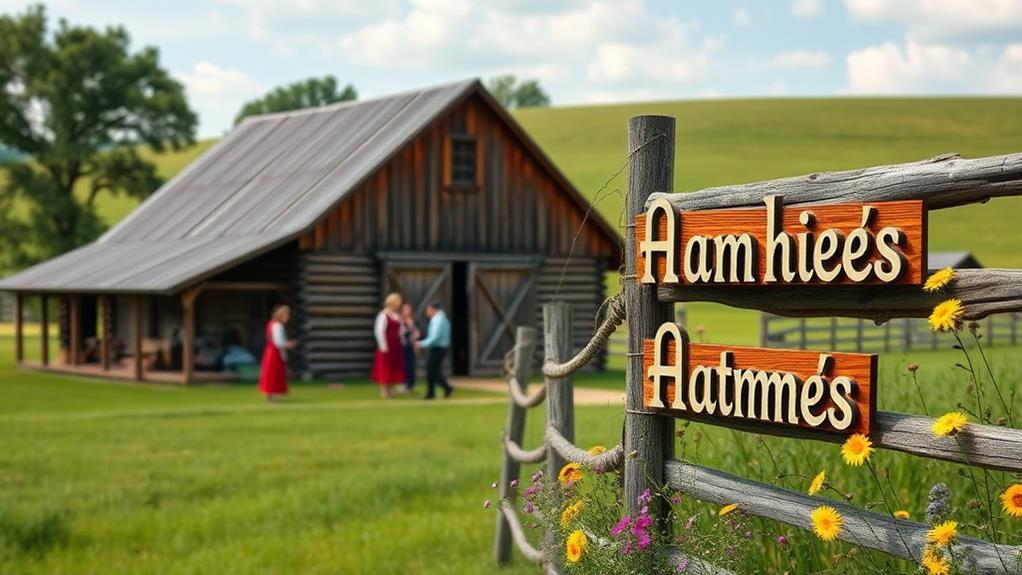
Amish naming customs reflect a blend of tradition and practicality, where names are chosen not just for their beauty but also for their significance. When you think about it, this careful selection often honors family members or reflects the values of the community. For instance, many Amish families name their children after grandparents or other relatives to maintain a connection to their heritage.
In addition, you'll notice that names often have biblical roots, emphasizing faith and spirituality. Parents believe that choosing a name with a good meaning can influence their child's character. So, names like Esther or Levi aren't uncommon, as they carry a sense of history and virtue.
Names are also chosen with consideration for how they sound in the Pennsylvania Dutch language, which many Amish communities speak. This practice ensures that the name fits seamlessly into daily life.
Moreover, you'll find that the Amish prefer traditional names over trendy ones, valuing the timeless over the fleeting. In their eyes, a name isn't merely a label; it's a part of one's identity and legacy, reflecting who they're and where they come from.
Surnames in the Amish Community
In addition to first names, surnames in the Amish community carry significant weight, often reflecting familial ties and regional history. These last names help you trace back generations and understand the connections within the community. For instance, you might come across surnames like Yoder, Miller, or Stoltzfus, which are quite common among the Amish.
Surnames can reveal much about a family's origins or the areas they settled in, as some names indicate specific locations or trades. You'll notice that many Amish surnames have German roots, highlighting the community's heritage and ancestry. Families often take pride in their names, as they symbolize not just their lineage, but also their values and traditions.
In the Amish community, it's common for individuals to share surnames, which can create a sense of belonging and unity. When you're talking to someone with a familiar last name, it might remind you of their family's history and the roles they've played within the community.
Understanding these surnames gives you a deeper appreciation for the culture and connections that shape the lives of the Amish people.
Gender Neutral Names
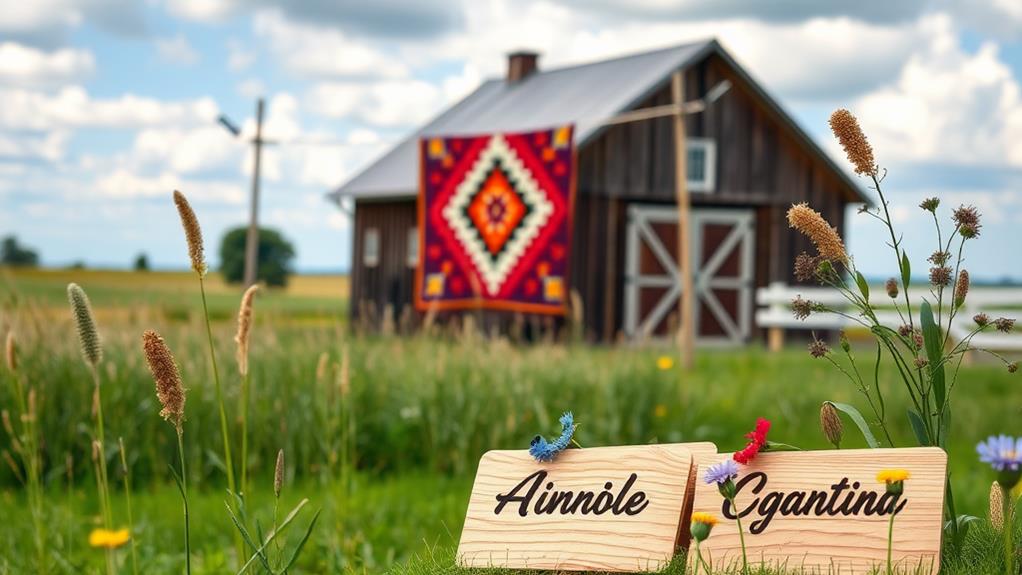
Often overlooked, gender-neutral names have gained popularity in the Amish community as families embrace a more inclusive approach to naming their children.
These names break traditional barriers and reflect a modern understanding of identity. You might be surprised to learn that many Amish families appreciate the flexibility and uniqueness that gender-neutral names offer.
Some popular choices include names like Morgan, Avery, and Taylor. These names work equally well for boys and girls, allowing for personal expression without the constraints of gender labels.
By choosing a gender-neutral name, parents can encourage their children to feel free and authentic in their identities.
Moreover, the use of gender-neutral names can foster a sense of community and acceptance within the Amish culture. Families recognize that each child is an individual, deserving of a name that can grow and change with them.
As you explore the world of Amish names, consider the beauty and inclusivity found in gender-neutral options. They not only honor tradition but also embrace a progressive outlook on naming, reflecting the evolving values of the community.
Regional Variations
Naming traditions vary significantly across different Amish communities, shaped by regional influences and cultural practices. You'll notice that names can change based on where families live. For example, in Pennsylvania, you might encounter names like Levi and Naomi, which reflect a mix of traditional biblical roots and local customs.
In contrast, the Amish in Ohio often prefer names like Mary and Samuel, emphasizing their strong ties to heritage and family history.
In Indiana, you may find even more unique variations, such as Elam for boys and Lydia for girls. These names often carry special meanings or connections to past generations.
Regional dialects and languages also play a role, with some communities adopting names that reflect their German or Swiss ancestry.
As you explore these variations, keep in mind that each name isn't just a label; it's a link to a community's identity and values. The choice of a name often signifies a family's hopes, dreams, or even a tribute to a beloved relative.
Names Inspired by Nature

Amish families often draw inspiration from the natural world when choosing names for their children. This connection to nature reflects their values and lifestyle, emphasizing simplicity and harmony with the environment. For boys, names like "River" and "Ash" evoke images of flowing waters and sturdy trees. These names not only sound strong but also carry a deeper meaning, reminding families of the beauty around them.
For girls, names such as "Rose" and "Meadow" capture the essence of blooming flowers and open fields. Such names symbolize growth, beauty, and the joy found in nature. Families often choose these names to instill a sense of appreciation for the world outside their doors.
In addition to being beautiful, nature-inspired names can serve as a reminder for children to cherish their surroundings. When you hear the name "Sky," you might think of vast, blue horizons, while "Lily" brings to mind serene ponds.
These names encourage a connection to the earth, fostering a sense of belonging and peace.
Family Names and Lineage
Choosing a family name for a child in the Amish community is a significant decision that honors lineage and heritage. Family names often carry deep meanings and connections to ancestors. When you select a name, you're not just picking something that sounds nice; you're linking your child to a rich history that spans generations.
Amish families tend to use surnames that reflect their heritage, often derived from German or Swiss origins. These names can reveal much about your family's past and the journey your ancestors took. For instance, names like Yoder or Stoltzfus might resonate with particular traditions or stories that are cherished within your community.
Additionally, family names can signify the roles and values that are important to you. By choosing a name, you're passing down not just a label, but a sense of belonging and identity. It's a way to ensure that your child feels connected to their roots while growing up in a vibrant community.
Influence of Pennsylvania Dutch
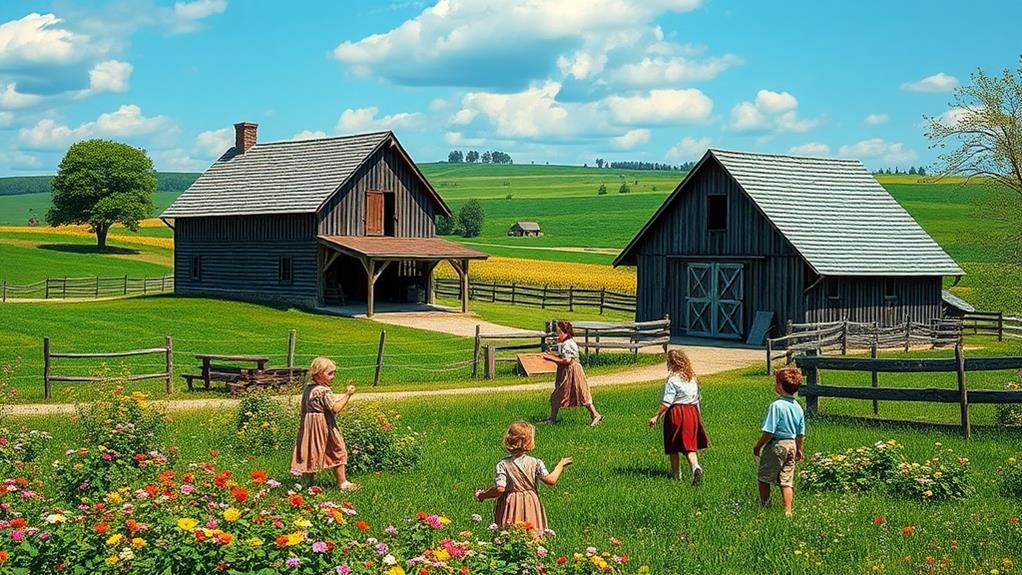
The rich heritage of Pennsylvania Dutch culture significantly influences the naming practices within the Amish community. When you look at names chosen for boys and girls, you'll often find a blend of traditional Germanic roots and local adaptations. Many Amish families prefer names that reflect their ancestry, often selecting ones that have been passed down through generations. This connection to the past is essential, as it reinforces family bonds and cultural identity.
In Pennsylvania Dutch culture, you might come across names like Levi, Anna, or Samuel. These names aren't just popular; they carry meaning and history, representing qualities valued by the community. Additionally, you may notice that some names are unique to the Amish, showcasing their distinct lifestyle and beliefs.
Interestingly, the use of Pennsylvania Dutch dialect also seeps into naming. Variations in spelling and pronunciation can create variations of familiar names, making them feel more personal.
Names From Amish Literature
Names in Amish literature often reflect the community's values and traditions, providing insight into their way of life. Through stories and novels, you'll find names that carry deep meanings, often tied to family history or character traits. For instance, names like "Levi" and "Emma" frequently appear, showcasing a blend of biblical origins and timeless appeal.
These names aren't just random; they symbolize qualities such as strength, kindness, and faithfulness, which are highly regarded in Amish culture. When you read about characters named "Samuel" or "Ruth," you can sense the connection to their heritage and the ideals they uphold.
Amish authors often emphasize simplicity and authenticity in their storytelling, and this extends to the names they choose. By selecting names that resonate within their community, they preserve a sense of identity and belonging.
As you explore Amish literature, pay attention to how these names reflect their way of life. Each name tells a story, connecting past generations with the present, and reminding readers of the values that are cherished within the Amish community.
Spiritual Significance
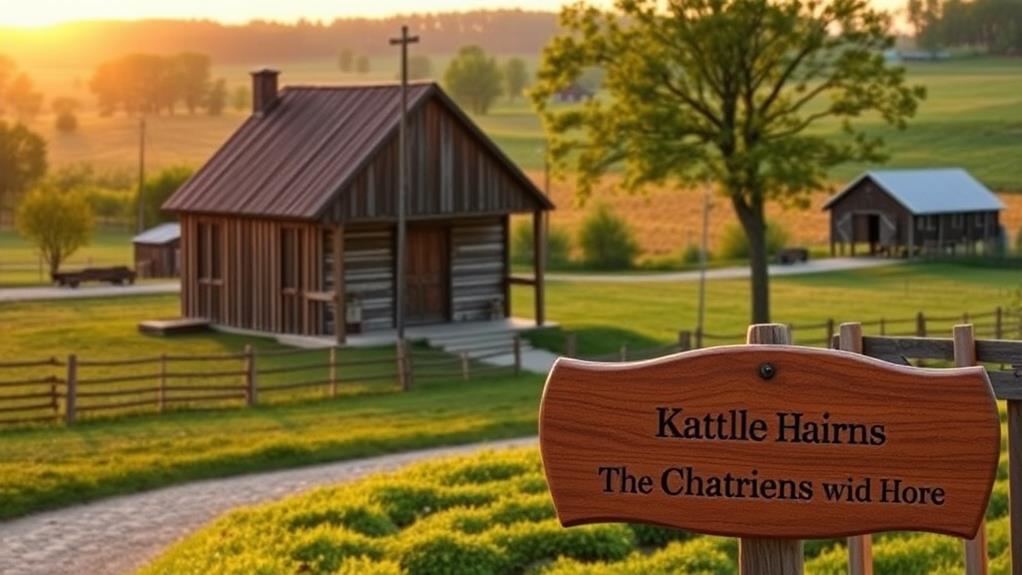
Amish names carry profound spiritual significance, reflecting the community's deep-rooted beliefs and values. When you choose an Amish name for a boy or girl, you're not just picking a label; you're embracing a tradition that honors faith, family, and simplicity. Many names are derived from biblical figures, symbolizing virtues like strength, kindness, and wisdom.
For instance, names like Isaac and Leah evoke the stories of the Old Testament, reminding the community of their spiritual heritage. You might also find names that resonate with the values of humility and service, which are central to Amish life. Every name tells a story, linking the child to their ancestors and to the values they hold dear.
Moreover, the choice of a name can reflect the hopes and aspirations parents have for their children. By selecting a name with spiritual significance, you're not only honoring tradition, but also instilling a sense of purpose and identity in the child. This connection to their roots fosters a strong sense of belonging, helping them grow into responsible members of their community.
Ultimately, these names serve as a reminder of the faith and values that shape Amish life.
Seasonal Names
Have you ever noticed how certain names evoke the essence of a particular season? Seasonal names perfectly capture the beauty and feelings associated with spring, summer, fall, and winter.
For instance, names like "Flora" or "Briar" remind you of blooming flowers and lush greenery, making them great choices for a spring baby.
In summer, names like "Soleil," meaning sun in French, or "Marina," associated with the sea, can reflect the warmth and joy of sunny days spent outdoors.
Meanwhile, autumn brings names like "Amber" or "Crispin," which are inspired by falling leaves and the harvest season. These names can resonate with the cozy feelings that come when the days get shorter.
Winter names such as "Holly" or "Frost" bring to mind the beauty of snow and festive cheer.
By choosing a seasonal name, you connect your child's identity to the rhythms of nature and the changing times of the year. It's a beautiful way to reflect your family's appreciation for the world around you.
Names Reflecting Values

Choosing a name can also be a powerful way to express your family's values and beliefs. In the Amish culture, names often reflect important principles such as faith, humility, and community. When you select a name, consider how it aligns with what you hold dear.
For instance, names like "Amos" or "Grace" convey a deep sense of faith and devotion. They remind your child of the importance of spirituality in their lives. Similarly, names such as "Frieda" or "Isaac" highlight the value of peace and kindness, traits that the Amish community cherishes.
You might also find inspiration in names that symbolize family unity. Names like "Clara," which means bright and clear, or "Samuel," meaning heard by God, carry significant meanings that can serve as guiding principles for your child.
Ultimately, the name you choose can be a lasting reminder of your family's values. By selecting a name that resonates with your beliefs, you're not just giving your child an identity; you're also instilling a sense of purpose and connection to their roots.
It's a beautiful way to pass down your family's legacy.
Lesser-Known Names
What if you want to explore unique names that stand out while still holding meaning? Lesser-known Amish names offer a treasure trove of options that can give your child a distinctive identity. These names often reflect deep cultural roots and rich traditions, making them special choices.
For boys, consider names like "Levi," which means "joined" or "attached." You might also like "Eben," meaning "stone," symbolizing strength and stability.
For girls, "Zilpha" is a lovely option, meaning "frail" or "delicate," while "Mara" signifies "bitter," carrying a sense of resilience.
These lesser-known names may not be as common, but they're filled with character and history. Choosing a name like these can connect your child to a beautiful heritage while ensuring they stand out in a crowd.
Each name tells a story, making them not just labels, but a part of your child's journey.
Pronunciation Guide
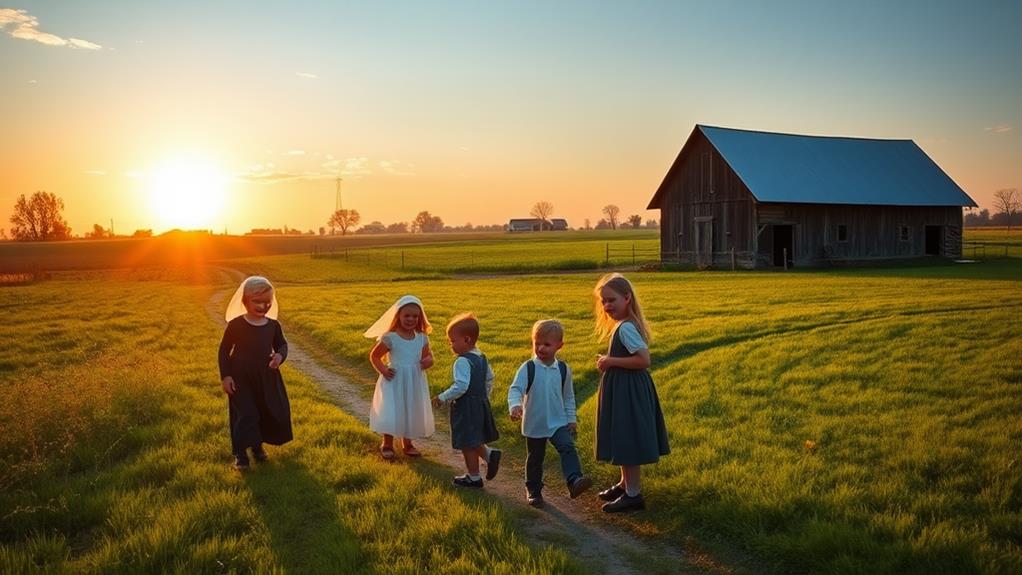
Names like "Frieda" are pronounced "FREE-duh," which can sometimes trip people up. It's always a good idea to listen to someone say it or check a reliable source. Pay attention to the vowels; they often have a softer sound than you might expect.
Another example is "Anabell," pronounced "AH-nah-bell." The emphasis is on the first syllable, making it flow smoothly.
When it comes to names like "Jethro," you'd pronounce it "JETH-roh," with a strong emphasis on the first syllable. This can really help you appreciate the beauty and rhythm of these names.
Lastly, don't hesitate to ask someone from the Amish community how to pronounce a name correctly; they'll likely appreciate your effort to respect their heritage.
With a little practice, you'll be ready to say these names confidently!
Choosing the Right Name
Finding the perfect name can feel daunting, especially when considering the rich cultural heritage of Amish names. You want a name that not only reflects tradition but also carries significance for your family.
Start by thinking about the meanings behind various names. Many Amish names have deep roots, often linked to biblical or historical figures, which can add a special touch to your child's identity.
Next, consider how the name sounds. Say it out loud and imagine calling your child by that name. Does it roll off the tongue? Does it feel comfortable? You might even want to ask family and friends for their opinions, as they can offer valuable insights.
Also, think about the potential nicknames that could arise from the name. Some names lend themselves to cute or cool nicknames, while others may not.
Finally, don't forget to consider the initials and how they pair with your last name. You want your child's name to be harmonious and easy to say.
Ultimately, choose a name that resonates with you and your family's values. With a little thought and reflection, you'll find the perfect Amish name that your child will cherish for years.
Impact of Technology
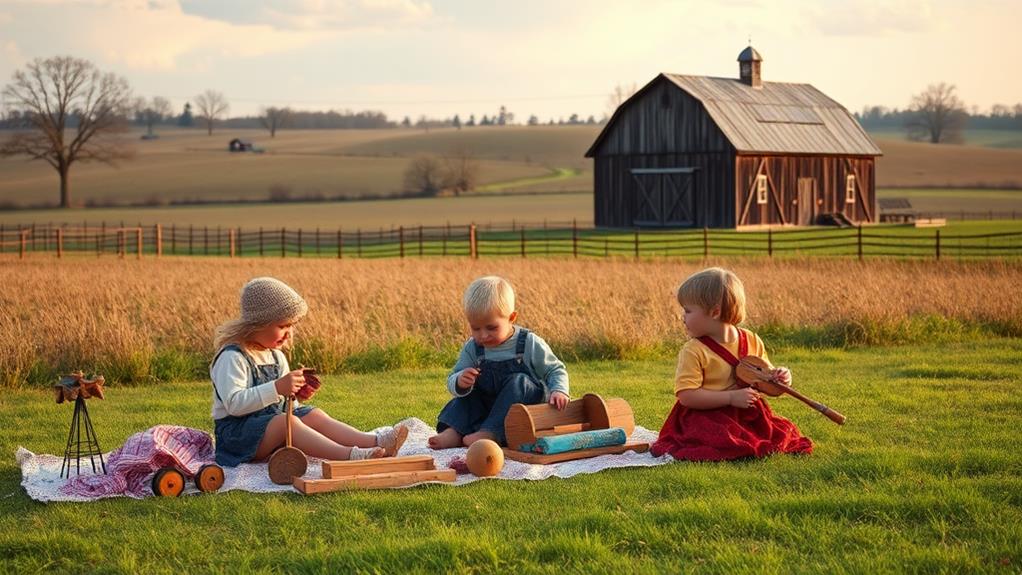
As you explore the significance of your chosen Amish name, it's important to recognize how technology influences today's naming practices. In our fast-paced world, people often turn to the internet for inspiration. Websites and social media platforms showcase popular names, including those with Amish roots, making it easier for parents to discover unique options.
You might notice that technology also helps families connect to their heritage. Online forums and groups allow individuals to share stories about their names and the traditions behind them. This digital sharing fosters a sense of community, even among those who live far apart.
However, technology can sometimes dilute the authenticity of names. With trends changing rapidly, some parents might choose names based on fleeting fads rather than their true significance. This can lead to a disconnection from the deep cultural meanings that many Amish names carry.
Ultimately, it's essential to balance modern influences with the rich history behind your chosen name. Embracing technology can enhance your understanding, but remembering the roots of your name will help preserve its authenticity for future generations.
Celebrating Amish Traditions
Celebrating Amish traditions enriches your understanding of the cultural significance behind names. When you dive into the world of the Amish, you'll discover that their customs are deeply rooted in their beliefs and way of life.
For instance, community gatherings, such as church services and barn raisings, play a central role in bringing families together. These events often showcase the importance of names, as they reflect heritage and familial ties.
Amish naming ceremonies are unique and filled with meaning. Names are often chosen based on family history, reflecting the values of simplicity and humility. You might notice that names like "Levi" or "Mary" are common, signifying a connection to biblical roots.
As you learn more about these traditions, you'll see how they shape the identities of individuals within the community.
Moreover, seasonal celebrations, such as Christmas and harvest festivals, highlight the Amish commitment to family and faith. During these gatherings, you'll witness the joy of shared stories, food, and laughter, reinforcing the bonds that names represent.
Resources for Further Exploration
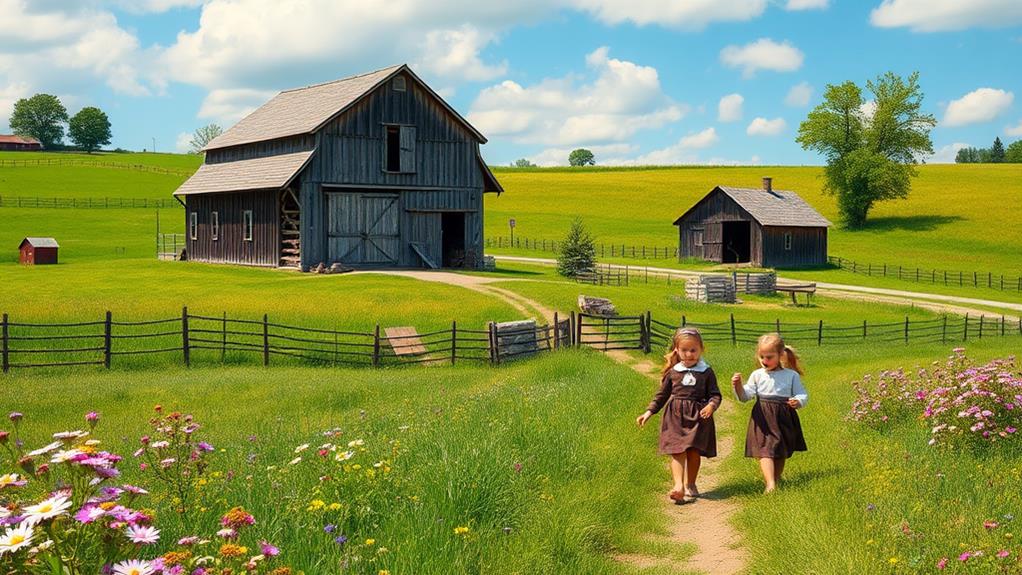
Exploration of Amish culture offers a rich tapestry of insights, especially when it comes to names. If you're curious about the meanings and traditions surrounding these names, several resources can help you dive deeper.
You might start by visiting local libraries or bookstores that feature sections on cultural studies, especially those focused on Pennsylvania Dutch heritage.
Websites like the Amish Studies Center provide articles and research papers that explore various aspects of Amish life, including naming conventions. You can also find informative documentaries on platforms like YouTube, showcasing interviews with Amish families discussing their customs and values.
Consider joining online forums or social media groups where people share their experiences with Amish culture. These communities can be valuable for gaining personal insights and asking questions about specific names or traditions.
Lastly, if you're interested in a hands-on experience, check for local Amish communities that offer tours or workshops. Engaging directly with the culture can provide you with a deeper appreciation for their naming traditions.

